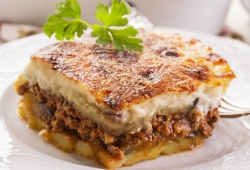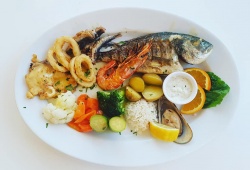Difference between Greek and Cretan Gastronomy
Greek cuisine is known for its fresh ingredients, bold flavors, and healthy dishes. However, when it comes to Cretan gastronomy, there are some distinct differences that set it apart from the rest of Greece. Cretan cuisine is heavily influenced by the island's geography, climate, and history, resulting in a unique culinary experience that is not found anywhere else in Greece. In this article, we will explore the key differences between Greek and Cretan gastronomy.
Geography and Climate
One of the main factors that differentiate Cretan cuisine from Greek cuisine is the island's geography and climate. Crete is the largest island in Greece and is located in the southern part of the Aegean Sea. The island's mountainous terrain and proximity to the sea have shaped its cuisine over the centuries. The fertile soil and mild climate allow for a variety of fruits and vegetables to grow year-round, while the sea provides an abundance of fresh seafood.
In contrast, mainland Greece has a more varied landscape, with mountainous regions, plains, and islands. The climate can also vary greatly depending on the region, with some areas experiencing hot summers and cold winters. This diversity in geography and climate has influenced the different regional cuisines found in Greece.
Ingredients
The availability of ingredients is another factor that sets Cretan cuisine apart from Greek cuisine. Cretan cuisine relies heavily on locally sourced ingredients, such as olive oil, herbs, and vegetables. The island is known for its high-quality olive oil, which is used in almost every dish. Herbs such as oregano, thyme, and rosemary are also commonly used to add flavor to dishes.
In contrast, Greek cuisine uses a wider range of ingredients, including meats such as lamb and pork, as well as cheeses such as feta and halloumi. While these ingredients are also used in Cretan cuisine, they are not as prominent as in other parts of Greece.
Preparation Methods
The preparation methods used in Cretan cuisine also differ from those used in Greek cuisine. Cretan dishes are often simple and rely on the quality of the ingredients, rather than complex cooking techniques. Grilling and roasting are common methods used to cook meats and vegetables, while stews and soups are also popular.
Greek cuisine, on the other hand, often involves more complex cooking techniques such as baking and frying. Dishes such as moussaka and spanakopita require multiple layers of ingredients and are baked in the oven. Fried foods such as calamari and saganaki are also popular in Greek cuisine.
History and Culture
The history and culture of Crete have also had a significant impact on its cuisine. The island has been inhabited since ancient times and has been influenced by various civilizations, including the Minoans, Romans, Byzantines, and Venetians. This rich history is reflected in the island's cuisine, which incorporates elements from these different cultures.
Greek cuisine, on the other hand, has been influenced by a variety of cultures over the centuries, including the Ottoman Empire and the Balkans. While these influences are present in Greek cuisine, they are not as pronounced as in Cretan cuisine.
Conclusion
In conclusion, while both Greek and Cretan cuisines share many similarities, there are some distinct differences that set them apart. The geography and climate of Crete have shaped its cuisine over the centuries, resulting in a unique culinary experience that cannot be found anywhere else in Greece. The use of locally sourced ingredients, simple preparation methods, and the island's rich history and culture have all contributed to the development of Cretan gastronomy. Whether you are a foodie or just looking to try something new, a visit to Crete is sure to be a culinary adventure.

















